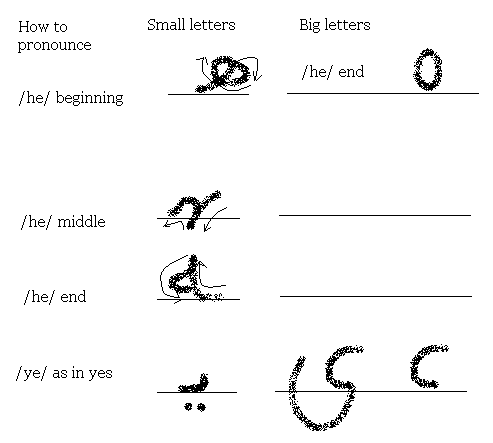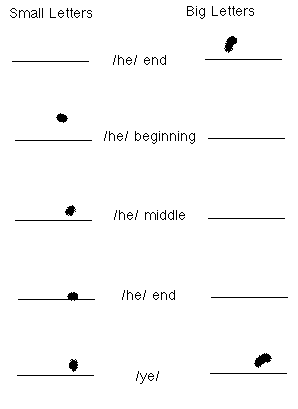
Persian Lesson 9 – Letters /he/ to /ye/, sokoon, tashdid
Presian Letters /he/ to /ye/, sokoon, tashdid
Hello everyone, Welcome back!
Today we continue with Presian letters /he/ to /ye/, sokoon, tashdid. How was the previous lesson? Let me know if you faced any problems. Today we are going to complete the part one which was about learning the letters and vowels. Most probably, we will take a very short review of the previous lessons next week. After that we will begin the main part of our work. Please try to get fluent with these basics now.
Last week, we learned four letters. Let’s take a look at them again. ![]() ,
, ![]() ,
, ![]() ,
, ![]() . Click here if you want to listen to them once more.
. Click here if you want to listen to them once more.
As you know, we have two more letters for today. Right? They are as follows:

31. ![]() This one is the big letter ‘H’ in Persian. It is called /he/ as in hen.
This one is the big letter ‘H’ in Persian. It is called /he/ as in hen.
It appears at the end of the words only and stands separated from other letters. Like this one: ![]() .
.
This letter has three small forms. Look at this ![]() . It appears at the beginning of the words and is attached to the next letter. Like here
. It appears at the beginning of the words and is attached to the next letter. Like here ![]() .
.
Sometimes it sits between two letters and attaches to both of them. In this case you will find it as ![]() . Like this word
. Like this word ![]() .
.
The third form is when it appears at the end of the words and is attached to the previous letter. In this case you will find it as ![]() .
.
When combined with the vowels, it may be pronounced as ![]() .
.
Note: As you see, these two letters ![]() and
and ![]() , when combined with the vowels, have the same pronounciation.
, when combined with the vowels, have the same pronounciation.
32. ![]() This is the big letter ‘Y’ in Persian. It is called /ye/ as in yes.
This is the big letter ‘Y’ in Persian. It is called /ye/ as in yes.
It appears at the end of the words and stands either attached or separated. Like these words: ![]() ,
, ![]() .
.
And finally, this is the small letter ![]() /ye/.
/ye/.
When combined, it may be pronounced as ![]() .
.
All right. Now that we have learned the letters and the way they are pronounced, I need to explain something that is somehow necessary.
As you remember, we have six vowels in Persian, which enable us to pronounce the letters. And as you have probably noticed, I have already mentioned that we have six main sounds (vowels). Do you remember? I said that because in addition to these six vowels we have two more that can hardly be called vowels.
Let me explain it a bit more. How do you pronounce this English word ‘address’? I am sure all of you can pronounce it well. It is something like this /ædres/. Is it correct? Good! Now tell me how do you pronounce the letters ‘d’ and ‘s’ here? It’s quite clear. Your tongue simply stops or pauses on these letters without producing any extra sounds. It seems not so important in English. Nevertheless, in Persian we have a name for this. It is called pause or sokoon /soku:n/in Persian.
The representative of this pause is what you see on ![]() .
.
Let’s see the second one. Look at this English word ‘attach’. As you see, we have two ‘T’ in this word. Just suppose that we are breaking this word like this: ‘at- tach’. What we find out here is that our tongue stops or pauses on the first ‘T’ and pronounces the second ‘T’. What the Persian grammar, or I’d better say the Arab-based grammar, is asking us to do is this: ” Whenever one letter is written twice and the first one is paused, we should simply delete the first one and pronounce the second one with an emphasis.” Is the explanation clear? I need to mention it here that this one is not used very often in Persian but it is used anyway!
This emphasis is called Tashdid /tæshdid/.
The representative of this emphasis or Tashdid is what you see here on ‘A’: ![]() . For example
. For example ![]() . You don’t need to worry about this. Maybe you will see it once in one hundred words and probably you won’t use this rule at all!
. You don’t need to worry about this. Maybe you will see it once in one hundred words and probably you won’t use this rule at all!

Click here if you need to listen to the four items you learned today.
All right. With this we come to the end of lesson 9 or the end of part one. I hope you have enjoyed it. Please be in touch!






Leave a Reply
Your email address will not be published. Required fields are marked *
All Comments (0)